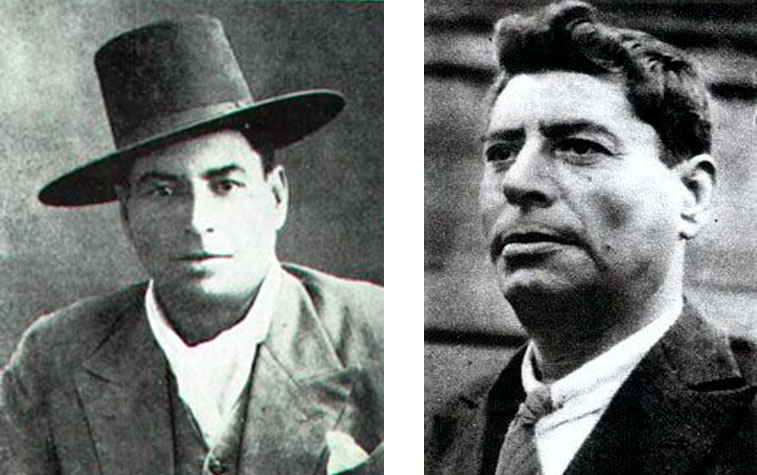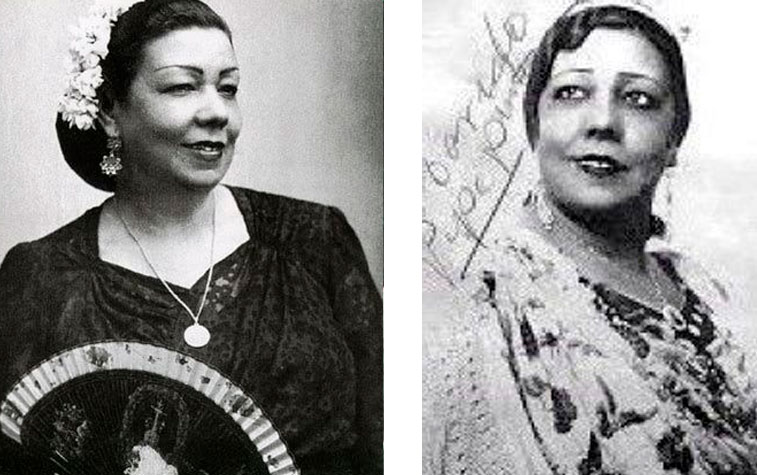“Game and duende theory”
Excerpts from the conference by Federico Gª Lorca
Read between 1932 and 1935, Federico García Lorca’s lectures underwent constant modifications depending on the audience, the place or the evolution of his aesthetic ideas. These are small excerpts from one of them, “Game and Theory of the Duende” edited by Comares (from different drafts, transcriptions, manuscripts, versions, press publications, etc.) carried out by Christopher Maurer in his edition of Conferences , Madrid. Alianza, 1984. (Note on Volume 19-Huerta de San Vicente Collection).
We believe it is a fundamental experience for an artist to read in Federico’s words what the commitment to the artistic search implies.
“Years ago, in a dance contest in Jerez de la Frontera, an eighty-year-old woman won the prize against beautiful women and girls with water waists, for the mere fact of raising her arms, raising her head and giving a blow with his foot on the platform, but in the gathering of muses and angels that were there, beauties of form and beauties of smile, that dying goblin who dragged his wings of rusty knives on the ground had to win and won.”
Years ago, in a dance contest in Jerez de la Frontera, an eighty-year-old woman won the prize against beautiful women and girls with water waistlines.

The great cantaor Manuel Torre (1878-1933) represents a type of existential cante, between loneliness, grief and heartbreak, and an aesthetic that had its continuity with Manolo Caracol, Antonio Mairena, Agudamientos or, more recently, with José Mercé .
Manuel Torre, a great artist from the Andalusian people, used to say to someone who sang: “You have a voice, you have the styles, but you will never succeed because you have no duende.”
Throughout Andalusia, the rock of Jaén or the shell of Cádiz, people constantly talk about the goblin and discover it as soon as it comes out with an effective instinct.
[…] the man of the greatest culture in blood that I have ever known, he said, listening to Falla himself his Nocturno del Generalife this splendid phrase: “Everything that has black sounds has a duende”. And there is no greater truth. These black sounds are the mystery.
[…] Thus, the goblin is a power and not a work, it is a struggle and not a thinking. I have heard an old master guitarist say: “The goblin is not in the throat; the goblin rises from the inside, from the soles of the feet.” That is to say, it is not a question of faculty, but of true living style; that is to say, of blood; of very old culture, and, at the same time, of creation in act.
This “mysterious power that everyone feels and no philosopher explains” is, in short, the spirit of the Earth.
To search for the goblin there is no map or exercise. It is only known that he burns blood like a tropic of glass, that he exhausts, that he rejects all the sweet geometry learned, that he breaks styles, that he leans on human pain that has no consolation.
To search for the goblin there is no map or exercise. It is only known that he burns blood like a tropic of glass, that he exhausts, that he rejects all the sweet geometry learned, that he breaks styles, that he leans on human pain that has no consolation.

“La Niña de los Peines” she met Lorca in the Madrid house of “La Angentinita”
“Once, the Andalusian” cantaora “Pastora Pavón, La Niña de los Peines, a somber Hispanic genius, equivalent in fantasy capacity to Goya or Rafael el Gallo, sang in a tavern in Cádiz.
She played with her shadow voice, with her voice of molten tin, with her voice covered with moss, and she tangled it in her hair or dipped it in chamomile or lost it to some dark and very distant jarales. But nothing; it was useless. The listeners were silent.
There was Ignacio Espeleta, beautiful as a Roman tortoise, who was once asked: “How do you not work?”; and he, with a smile worthy of Argantonio, replied: “How am I going to work, if I’m from Cádiz?”
There was Eloísa, the hot aristocrat, whore from Seville, a direct descendant of Soledad Vargas, who in 1930 she did not want to marry a Rothschild because she did not match her in blood.
There were the Floridas, who people think are butchers, but who are actually ancient priests who continue to sacrifice bulls to Gerión, and at one angle, the imposing rancher Don Pablo Murube, with the air of a Cretan mask.
Pastora Pavón finished singing in the midst of silence. Alone, and sarcastically, a tiny man, one of those manly dancers who suddenly emerge from bottles of brandy, said in a very low voice: “Long live Paris!”, As if to say: “Here we don’t care about faculties, Neither technique nor mastery, we care about something else.
Pastora Pavón finished singing in the midst of silence. Alone, and sarcastically, a tiny man, one of those manly dancers who suddenly emerge from bottles of brandy, said in a very low voice: “Long live Paris!”, As if to say: “Here we don’t care about faculties, Neither technique nor mastery, we care about something else.

Pastora Pavón “La Niña de los Peines” (1890-1969)
Then La Nina de los Peines got up like a madwoman, shattered like a medieval weeping woman, and drank in one gulp a large glass of cazalla like fire, and sat down to sing without voice, without breath, without nuances, with her throat scorched, but … with goblin.
She had managed to kill the entire scaffolding of the song to make way for an angry and scorching goblin, a friend of sand-laden winds, who caused listeners to rip their suits almost at the same rate as the black Antilleans rip them.
La Niña de los Peines had to tear her voice apart because she knew that she was listening to exquisite people who did not ask for shapes, but marrow of shapes, pure music with a succinct body to be able to stay in the air.
She had to become impoverished of faculties and security; that is to say, she had to keep the muse away from her and be left helpless, that her goblin came from her and deigned to fight to the bone.
Faculties and security had to be impoverished; that is to say, she had to keep the muse away from her and be left helpless, that her goblin came from her and deigned to fight to the bone.
And how he sang! His voice was no longer playing, his voice was a stream of blood worthy of his pain and her sincerity, and she spread like a ten-fingered hand through feet nailed but full of squall.
The arrival of the duende always presupposes a radical change in all the forms on old planes, it gives totally new sensations of freshness, with a newly created, miraculous quality of rose that produces an almost religious enthusiasm “.
The arrival of the duende always presupposes a radical change in all the forms on old planes, it gives totally unprecedented sensations of freshness, with a newly created, miraculous quality of rose that produces an almost religious enthusiasm.
[…] The duende must be awakened in the last rooms of the blood. And reject the angel, and kick the muse.
The real fight is with the duende.



